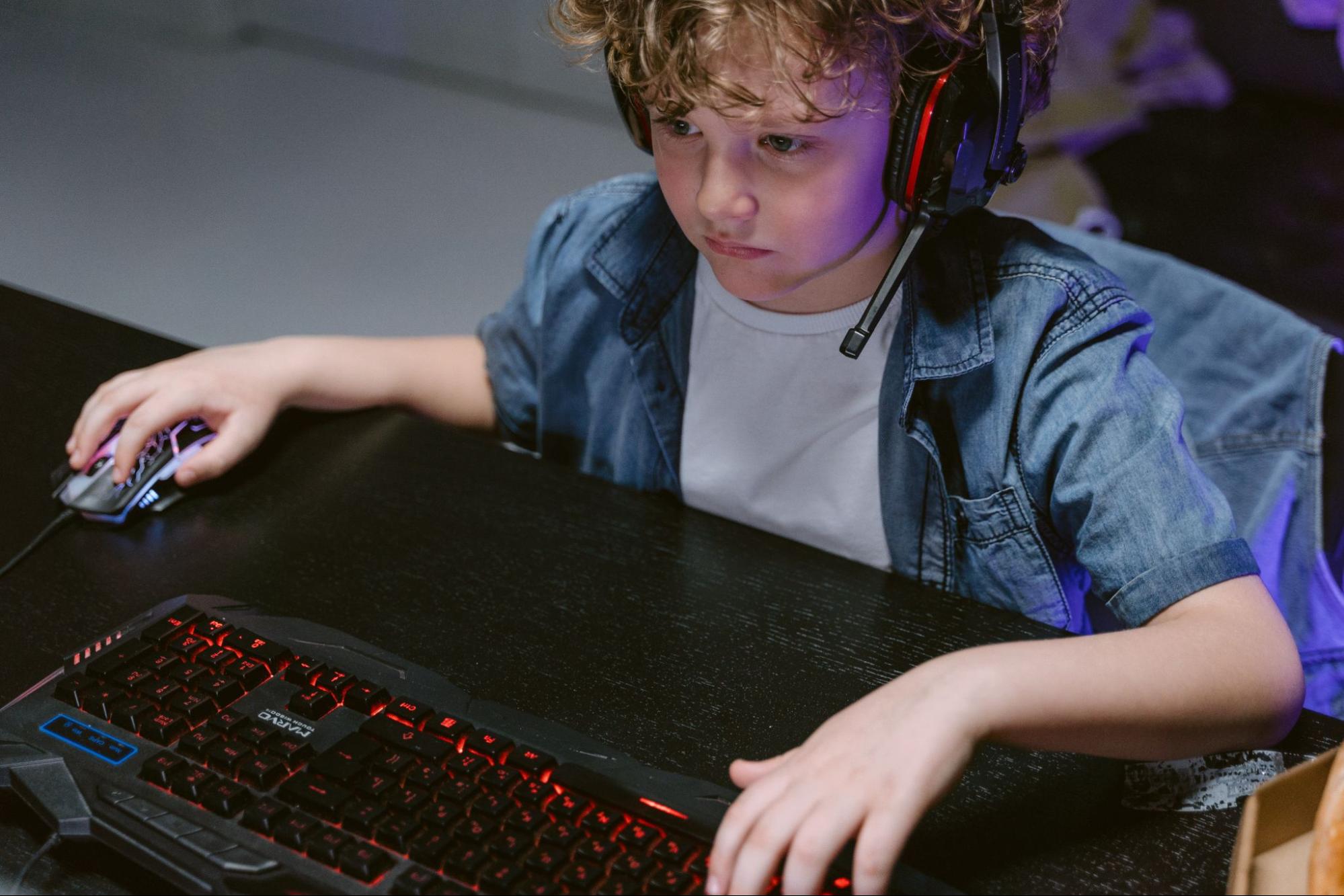How To Break Your Child’s Video Game Addiction

It’s worrying to think that children are at risk of any addiction. Many young children born in this generation have a vast understanding of technology even before they can speak properly. Most can pick up a tablet, controller or smartphone and get to their favourite shows or video games; sitting inside consuming hours of content on demand.
If you are a parent or carer concerned about the amount of time your child spends gaming and want to know how to treat it, then please read on.
Content
What Causes Gaming Addiction in Children?

Gaming in moderation can be a fun way for children to socialise, relax and express themselves. With such a large variety of video games available these days there is something for every child’s interests and personality. However, like most things with children their consumption has to be regulated. Often children will binge and play for long hours without any self-control if you allow them to. Children are at risk of developing video game addiction as they do not have many important responsibilities to pull them away from gaming as many adults do.
The science of video game addiction is fairly simple and similar to other behavioural addictions. When a child plays video games they get addicted to the feel-good sensation from winning or achieving things within the game. This feel-good sensation is caused by dopamine, the neurochemical responsible for bringing the child back to gaming. The negative effects of this we’ll discuss later, but for now, it’s important to understand that this can have detrimental effects in the long term.
The causes of video game addiction aren’t always so cut and dry as we explain in our Complete Guide to Video Game Addiction. Their addiction or dependence on video games can be multifactorial:
Escapism – Children may use gaming as a way to cope with negative feelings or situations. Stress from schoolwork, falling out with friends, family problems at home and so on. When being immersed in a video game we are taken away from the problems of the real world. Although this can be a positive momentary break. When children run from these emotions they may lack the ability to healthily deal with these emotions in future and further fuels their addiction to video games.
Social Acceptance – Video games sweeping across the playground has caused them to become a big part of socialisation amongst children. Teaming up online to play after school is how some friendships and bonds are formed. However, this seemingly enjoyable experience can get out of hand as many children neglect the real-life aspect of socialising. This can have negative impacts on a child’s social ability growing up, particularly in those who are shy or suffer from social anxiety. In extreme cases, people isolate themselves indoors, living online where most of their relationships are built and where they feel most comfortable and accepted.
Trauma – Stress relief is a very important driving factor in playing video games. The feel-good factor and sense of accomplishment we get from playing video games are sometimes enough to calm the overwhelming sensation of traumatic events throughout a child’s life. Situations such as various forms of abuse, death in the family and other impactful events can lead to anxiety or difficulty regulating emotions. A common way of dealing with these negative thoughts or emotions is turning to distractions such as video games. Which in their case provide a sustainable form of relief.
Signs That My Child is Addicted to Video Games

Commonly video game addiction is diagnosed far too late. Once individuals reach a certain level of emotional maturity they start to see the error of their ways. However, the addictive warning signs and symptoms are still consistent amongst adults and children. Some major red flags are a decline in:
- Academic Performance
- Physical health and hygiene
- Personal relationships with friends and loved ones
- Mental health and wellbeing
The World Health Organisation (WHO) has recognised video game addiction as an official mental health condition. The WHO explains that individuals who demonstrate significant impairment across family, social, educational, occupational or other important areas of functioning, qualify for “Gaming disorder” as it is formally known. Healthcare systems such as the UK National Healthcare Service (NHS) have set up long term treatment plans for young people to provide support and professional help for those suffering from video game addiction.
Other symptoms that could be harder to spot but may be experienced by your child are:
- Obsessive thinking about video games when not playing
- Losing concept of time, numerous hours passing without realising when playing
- Feeling irritable and agitated when not playing, mood swings without playing
- Lying to conceal gaming habits
Some parents often wonder how much video games is too much. But the question should be more focused on the impacts of their gaming habits. Many children can play video games for several hours whilst still maintaining good academic, physical and mental health. The duration that children play for can be very variable depending on the video game of their choice. For instance, a game of Fortnite is short, roughly 20 minutes compared to a game of Counter-Strike which could last up to 90 minutes. Therefore we must look at all of the evidence when considering video game addiction not just how long they play.
Negative Effects on Mental Health

Lack of motivation and Neglecting Responsibilities – As we previously mentioned playing video games provides a dopamine release that gives us a sense of achievement. When playing video games we overexpose our brain to dopamine and cause it to become desensitised to it. Meaning we need to play more video games to feel the same level of enjoyment. The problem with this is our brain starts to lose interest in anything else that doesn’t provide this level of stimulation. Playing outside, time with the family, going swimming can all become “boring” compared to gaming.
Our brains are wired in such a way where we feel good when we overcome a challenge. Hence motivating us to pursue difficult goals in life and to gain our reward. The problem with video games is that it creates a non-beneficial shortcut to this reward. Video games create an achievable challenge with instant gratification that takes away from a child’s motivation for real-life goals; as they get their sense of triumph from gaming.
Anxious and Depressed – There is a significant correlation between those suffering from depression and anxiety and video game addiction. Professionals speculate that video games interrupt an individuals life preventing them from achieving goals leads to them being unhappy and depressed.
Furthermore, someone who is addicted to video games typically neglects all other responsibilities. In doing so they acknowledge that they aren’t doing the things they, should be but can’t stop gaming, thus leading to worrying thoughts about the consequences of their behaviour. Video games aren’t the only root cause of anxiety and depression hence why it is important to seek help from a healthcare professional to diagnose any underlying conditions you are not aware of.
How to Stop Your Child Playing Video Games

Many parents run into a lot of conflict with their children when it comes to this inevitable step. With children and gaming, we have to bend the conventional treatment methods of video game addiction to their needs. Parents are still ultimately in control of how their children conduct themselves, which is a major difference between children and adults who suffer. Here are a few of the most useful methods from The Mindful Gamer gaming addiction treatment; proven to limit the amount of video games your child is playing, without causing any unnecessary confrontation.
Set healthy boundaries – If your child’s gaming habits are getting out of hand then removing them altogether may not be the best idea as the emotional toll could result in tantrums, arguments and disputes that could be avoided. Instead, sit down and discuss a reasonable amount of time to play throughout the week. It could be for 1 hour at a time of their choice, a certain number of games per night or maybe exceptions on weekends. The purpose of this is to preserve as much of the enjoyment they get from their gaming time while still limiting it to enhance productivity. Playing video games can be a very social experience for children, So allowing them time to play when their friends are could be a good opportunity to build or maintain friendships.
Monitor Your Child’s Game Time – We all want to wholeheartedly trust that our children follow the rules that we set, but sometimes, the temptation can get the better of them. Especially during these times, where children are required to use their computers and devices for online learning and homework. With work and play being separated by just a few clicks it’s easy to see how a child addicted to video games could crack under the pressure. There are numerous apps and browser extensions available to track and limit the use of video games such as: Limit, StayFocused or Freedom. The importance of taking notice of this is that lying to conceal gaming habits is a very common symptom of video game addiction so it is important to treat it accordingly.
Provide Alternative Activities – After removing the majority of their gaming time it could be extremely unproductive to leave it as an empty void for them to do nothing but daydream about the next time they can play video games. It’s times like these when some parents might throw their child a book and ask them to read as a means of satisfying their hunger for entertainment. However, a child that has become accustomed to this level of satisfaction through video games simply won’t enjoy or have the capacity to engage with a book the way many others could. A better solution would be to provide an activity high in adrenaline and stimulating to satisfy them in a healthier outlet. Most video games subject children to high stress and high reward situations so activities like martial arts, rock climbing or performing arts can tap into their need for adrenaline and competition.
Video Games as A Reward – To avoid becoming the enemy when coming between your child and their video games, create a sense of incentive behind playing video games. If your child’s grades have fallen due to their gaming habits then explain that they can play after they study for an hour. Maybe come to an agreement that they can play more frequently if their grades improve. If they practice their instrument for an hour they get an hour of game time. Even reward their good behaviour with an increase of time on the weekends.
The purpose of this technique is to reinforce the good behaviours they would otherwise neglect while still offering the opportunity to play video games. By outright saying no to video games and forcing them to be more productive in your child’s mind you are the cruel ruler of the house. However, in using this method they are in control of their game time. It is all dependent on how they adapt their behaviour to be healthier and receive their reward.
Set Long Term Goals – As previously mentioned, your child’s motivation towards achieving long term life goals may have been skewed by the effects that video games have on the reward centres of their brain. So one option is to sit down together and plan some achievable long term goals they would like to complete before they turn a specific age. The long term goals could be anything they take interest in:
- Learn their favourite gymnastics move
- Play a specific song on an instrument
- Build a fort to play in
- Learn to cook a simple dish
It’s important to sit down and plan together how they are going to achieve these goals and the things they need to do. Often in video games, their path to victory or rewards is very clearly mapped out so we have to appeal to this concept if they are to express a similar level of interest. Furthermore, this exercise creates a healthy habit moving forward in life. If your child can adopt the routine of setting goals and working towards them then the sky is the limit!
Working Together

Treating your child’s video game addiction is important but so is maintaining a healthy relationship with them. Video game addiction can be a very lonely and isolating condition so it’s important that your child feels you are understanding and on their side. Talk to them and try to gauge what makes them turn to video games and see if there is anything that you personally can change.
Working together as a team will make them more receptive to your rules and guidance. Trusting that your decisions are for the better. Ultimately taking video games away from your child should not be the end goal of your intervention. But rather to teach them that video games are to be enjoyed as a recreational activity and not as a routine.








